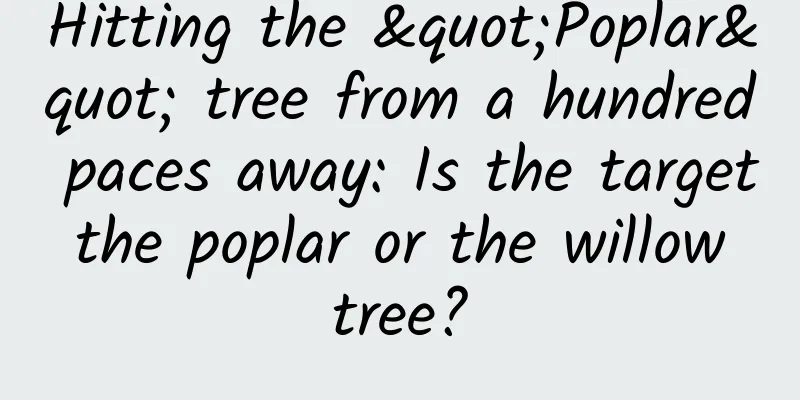Hitting the "Poplar" tree from a hundred paces away: Is the target the poplar or the willow tree?

|
Have you heard of shooting an arrow through a target at a hundred paces? In the Jingmen Garden of the Garden Expo Park, there is a scene like this: a willow tree stands tall and straight, facing the wind. Not far away, there is a golden statue fully armed and holding a bow and arrow, and the arrow in its hand seems to be about to break through the wind! What is shown here is the famous scene of the Chu general Yang Youji shooting at several red willow leaves one hundred steps away in a row during an archery competition. So why is the idiom "Yang" mentioned in the idiom, but a willow tree is planted here to represent "shooting through the willow tree from a hundred steps away"? Was it a poplar or a willow tree that Yang Youji shot? In fact, Liu Xiang of the Western Han Dynasty wrote in "Strategies of the Warring States: Strategies of the Western Zhou Dynasty": "There was a man named Yang Youji in Chu who was good at archery. He shot at willow leaves from a hundred steps away and never missed a single shot." It clearly pointed out that Yang Youji shot at willow leaves. So why don't people say that Yang Youji "shot a willow through a hundred steps" but "shot a poplar through a hundred steps"? In fact, in ancient my country, "Yang" referred to a type of "willow". In the "Explanation of Wood" chapter of "Er Ya", the earliest monograph on the meaning of words in ancient my country, there is such a record: "Cheng (chēng), river willow; Mao (máo), marsh willow; Yang, cattail willow." Therefore, it is not surprising to say that "shot a willow through a hundred steps" is "shot a poplar through a hundred steps". Then the "Yanghua" in the poem "When Wang Changling was demoted to Longbiao, I sent this letter to him from afar" written by the poet Li Bai, "Yanghua has fallen and the cuckoo is crying", actually refers to the catkins flying all over the sky in spring. In the imagery of Chinese classical literature, "Yanghua" is precisely the most changeable and emotionally complex "flower". In the writings of different poets, "Yanghua" often has very different meanings. Some people love the free and unrestrained fluttering of Yanghua in the wind, so they wrote "The spring breeze is free in the Yanghua, which is unwilling to be painted in the hall"; some people hate the fluttering of Yanghua, which goes with the flow, so they wrote "Human feelings are like catkins, which are melodious and follow the spring breeze"; some people cherish the softness of Yanghua, which makes people feel melancholy, so they wrote "The luxuriant flowers are full of feelings, and the gentle wind contains thoughts". All these show the charm of Yanghua. In fact, throughout history, the word "yangliu" is not the only word whose meaning has changed and has been misunderstood by people. Do you know other words with different meanings in ancient and modern times? Source: Chongqing Garden Expo Park Management Office Audit expert: Li Yuanyuan Statement: Except for original content and special notes, some pictures are from the Internet. They are not for commercial purposes and are only used as popular science materials. The copyright belongs to the original authors. If there is any infringement, please contact us to delete them. |
<<: There is a lot of foam in the urine. Is it really caused by proteinuria?
Recommend
How big is the intellectual property gap between Xiaomi, Meizu and Apple?
"You still have to have dreams. What if they...
Lessons from Momo’s overseas market promotion!
On August 27, Momo released its second quarter 20...
Do children really grow faster in spring?
Children today are faced with many challenges alo...
Severe crackdown! Why was the tiny earthworm included in the Central Government’s No. 1 document?
Recently, the release of the 2023 Central Documen...
Reviewing the operation of NetEase Yanxuan’s 411 anniversary event!
NetEase Yanxuan is different from platform-based ...
How to bid and match Google/Baidu SEM keywords?
Bidding and matching methods are the two most imp...
Chestnut-throated Bee-eater: This is what China's most beautiful bird looks like
A bird's eye view of science Quanzhou Associa...
Tuna will die if it doesn't swim? Let me see who is talking nonsense
Have you ever thought about There is no bed and n...
They account for half of winter vegetables, but are said to be unsafe and nutritious? Off-season vegetables are so unfair!
Author: Wang Lu, Chinese registered dietitian, Ma...
What are some commonly used things in public places that are actually dangerous? !
Planning and production Source: Curious Doctor Ed...
Price inquiry for development of Guyuan catering mini program. How much does it cost to develop Guyuan catering mini program?
In order to better penetrate into various industr...
Lanzhou takeaway platform applet development, what are the advantages of catering takeaway applet?
Soon after the beginning of the year, epidemics b...
[Practical Information] H5 Production Tools Competition!
As a marketing person who works on the front line...
Is there hope? Rumor has it that AirPods wireless headphones will go on sale next week
On the morning of November 11, it was reported th...
Put music in your pocket: A comprehensive collection of Hi-Fi flagship models
Hi-Fi is the abbreviation of High-Fidelity in Eng...









